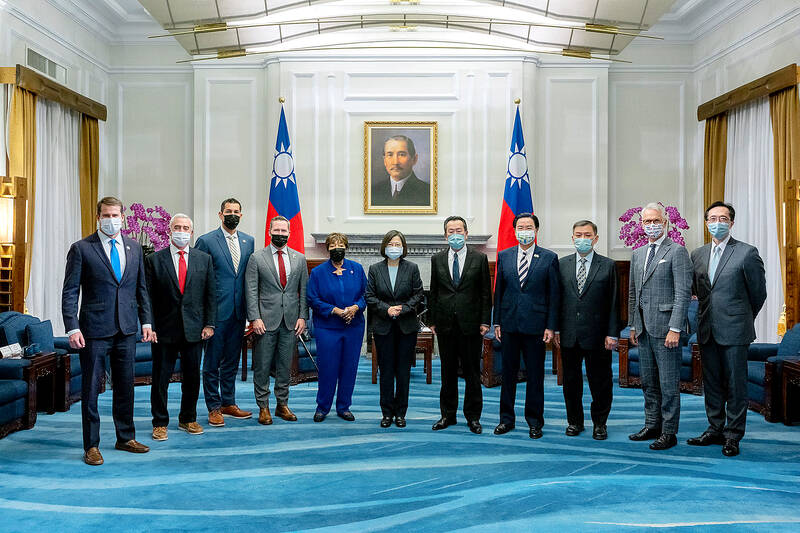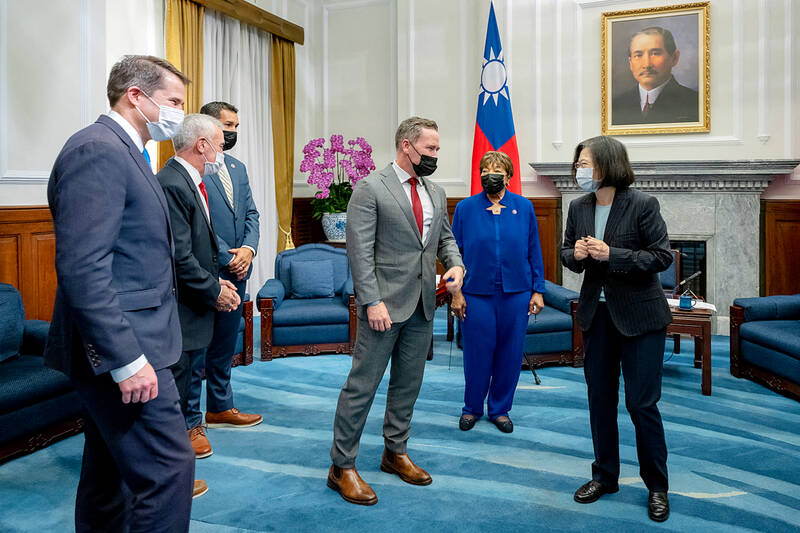The US’ commitment to the security of the Indo-Pacific region is “stronger than ever,” US Representative Eddie Bernice Johnson said during a meeting with President Tsai Ing-wen (蔡英文) in Taipei yesterday.
“I am in Taiwan ... to remind the world that our commitment and shared responsibility for a free and secure Indo-Pacific region remains stronger than ever,” said Johnson, who arrived on Sunday for a four-day visit and took part in Double Ten National Day celebrations in Taipei on Monday.
Describing Taiwan as “a vital trading partner” for the US and its allies, Johnson, who is chairwoman of the US House of Representatives Science, Space and Technology Committee, said that the US-Taiwan relationship is “essential to our national and economic security.”

Photo courtesy of Taiwan Presidential Office
The Democratic lawmaker from Texas also said that she looked forward to strengthening the bond between Taiwan and Texas, and “continuing my dialogue with President Tsai to create even more opportunity and a better future for our countries.”
She mentioned in particular a plan by GlobalWafers Co (環球晶圓) to invest US$5 billion to build a plant in Sherman City, Texas, creating an estimated 1,500 jobs.
Johnson also said she discussed with Taoyuan Mayor Cheng Wen-tsan (鄭文燦) and other officials the possibility of Taiwan Taoyuan International Airport joining the US Customs and Border Protection’s preclearance program.

Photo courtesy of Taiwan Presidential Office
Under the program, US customs officers are stationed at designated airports to screen travelers before they board US-bound flights, allowing them to bypass some inspections upon arrival.
Adding Taoyuan airport would make travel between Taiwan and the US smoother, as well as enhance communication and safety, Johnson said.
Also joining Johnson in the meeting with Tsai were four other US representatives, who arrived in Taiwan on Tuesday for a three-day visit — Democrats Seth Moulton and Kai Kahele, and Republicans Brad Wenstrup and Michael Waltz.
Echoing Johnson’s comments, Moulton said the relationship between Taiwan and the US is founded on the shared values of freedom, democracy and the rule of law.
“We look forward to strengthening and deepening the economic partnership between Taiwan and America,” he said.
As a soldier, Moulton said he learned to stand up for shared values.
Just like Ukrainians, Taiwanese are brave enough to defend their freedoms, he said, adding that he is honored to stand beside them.
Meanwhile, Tsai said Taiwan was willing to further deepen cooperation with the US and all democratic partners to contribute to regional and global peace and stability.
She also expressed hope that the visiting US lawmakers would continue to support Taiwan in the US Congress and back the signing of a double taxation avoidance agreement.
The Ministry of Finance in July said that Taipei and Washington had inked taxation-related deals, such as a transportation income tax agreement in 1988.
However, the two countries have not entered into a comprehensive and reciprocal tax treaty that includes the reduction or elimination of double taxation on individuals and businesses with operations in each other’s country, the ministry said.

A magnitude 7.0 earthquake struck off Yilan at 11:05pm yesterday, the Central Weather Administration (CWA) said. The epicenter was located at sea, about 32.3km east of Yilan County Hall, at a depth of 72.8km, CWA data showed There were no immediate reports of damage. The intensity of the quake, which gauges the actual effect of a seismic event, measured 4 in Yilan County area on Taiwan’s seven-tier intensity scale, the data showed. It measured 4 in other parts of eastern, northern and central Taiwan as well as Tainan, and 3 in Kaohsiung and Pingtung County, and 2 in Lienchiang and Penghu counties and 1

FOREIGN INTERFERENCE: Beijing would likely intensify public opinion warfare in next year’s local elections to prevent Lai from getting re-elected, the ‘Yomiuri Shimbun’ said Internal documents from a Chinese artificial intelligence (AI) company indicated that China has been using the technology to intervene in foreign elections, including propaganda targeting Taiwan’s local elections next year and presidential elections in 2028, a Japanese newspaper reported yesterday. The Institute of National Security of Vanderbilt University obtained nearly 400 pages of documents from GoLaxy, a company with ties to the Chinese government, and found evidence that it had apparently deployed sophisticated, AI-driven propaganda campaigns in Hong Kong and Taiwan to shape public opinion, the Yomiuri Shimbun reported. GoLaxy provides insights, situation analysis and public opinion-shaping technology by conducting network surveillance

‘POLITICAL GAME’: DPP lawmakers said the motion would not meet the legislative threshold needed, and accused the KMT and the TPP of trivializing the Constitution The Legislative Yuan yesterday approved a motion to initiate impeachment proceedings against President William Lai (賴清德), saying he had undermined Taiwan’s constitutional order and democracy. The motion was approved 61-50 by lawmakers from the main opposition Chinese Nationalist Party (KMT) and the smaller Taiwan People’s Party (TPP), who together hold a legislative majority. Under the motion, a roll call vote for impeachment would be held on May 19 next year, after various hearings are held and Lai is given the chance to defend himself. The move came after Lai on Monday last week did not promulgate an amendment passed by the legislature that

AFTERMATH: The Taipei City Government said it received 39 minor incident reports including gas leaks, water leaks and outages, and a damaged traffic signal A magnitude 7.0 earthquake struck off Taiwan’s northeastern coast late on Saturday, producing only two major aftershocks as of yesterday noon, the Central Weather Administration (CWA) said. The limited aftershocks contrast with last year’s major earthquake in Hualien County, as Saturday’s earthquake occurred at a greater depth in a subduction zone. Saturday’s earthquake struck at 11:05pm, with its hypocenter about 32.3km east of Yilan County Hall, at a depth of 72.8km. Shaking was felt in 17 administrative regions north of Tainan and in eastern Taiwan, reaching intensity level 4 on Taiwan’s seven-tier seismic scale, the CWA said. In Hualien, the